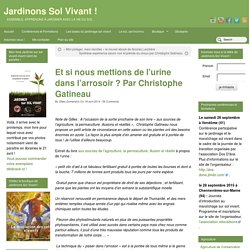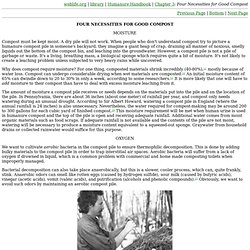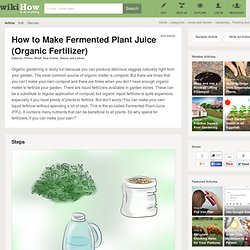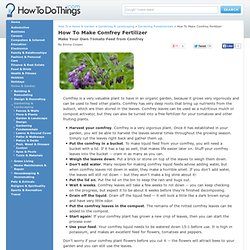

Et si nous mettions de l'urine dans l'arrosoir ? Note de Gilles : A l’occasion de la sortie prochaine de son livre « aux sources de l’agriculture, la permaculture, illusions et réalités », Christophe Gatineau nous propose un petit article de circonstance en cette saison où les plantes ont des besoins énormes en azote.

La façon la plus simple d’en amener est gratuite et à portée de tous ! Je l’utilise d’ailleurs beaucoup. Extrait du livre aux sources de l’agriculture, la permaculture, illusion et réalité à propos de l’urine : « petit clin d’œil à ce fabuleux fertilisant gratuit à portée de toutes les bourses et dont à la louche, 7 millions de tonnes sont produits tous les jours par notre espèce. Gratuit parce que chacun est propriétaire de droit de ses déjections ; et fertilisant, parce que les plantes ont les moyens d’en extraire la substantifique moelle. La technique du « pisser dans l’arrosoir » est à la portée de tous même si le genre féminin se positionne dès le départ avec un handicap … Weblife.org: Humanure Handbook: Chapter 3: Four Necessities for Good Compost. Compost must be kept moist.

A dry pile will not work. When people who don't understand compost try to picture a humanure compost pile in someone's backyard, they imagine a giant heap of crap, draining all manner of noxious, smelly liquids out the bottom of the compost bin, and leaching into the groundwater. However, a compost pile is not a pile of garbage or waste. It's a living, breathing mass, a biological sponge which requires quite a bit of moisture. It's not likely to create a leaching problem unless subjected to very heavy rains while uncovered. Why does compost require moisture? The amount of moisture a compost pile receives or needs depends on the materials put into the pile and on the location of the pile.
We want to cultivate aerobic bacteria in the compost pile to ensure thermophilic decomposition. Bacterial decomposition can also take place anaerobically, but this is a slower, cooler process, which can, quite frankly, stink. Hmmm. Source: The Humanure Handbook. YouTube - Commercial Composting from Green by Nature YouTube - Compost Tea Part 1 YouTube - Testing Home Compost Units: Part 2 How to Make Fermented Plant Juice (Organic Fertilizer): 10 steps. Edited by 157hive, Writelf, Einar Kramer, Maluniu and 3 others Organic gardening is really fun because you can produce delicious veggies naturally right from your garden.

The most common source of organic matter is compost. But there are times that you can't make your own compost and there are times when you don't have enough organic matter to fertilize your garden. There are liquid fertilizers available in garden stores. These can be a substitute to regular application of compost, but organic liquid fertilizer is quite expensive, especially if you have plenty of plants to fertilize. Ad Steps 1Combine the raw materials (see Things You'll Need below) in a 1:1:1 ratio. 10Application: Mix 1 cup of the liquid to 1 gallon of chemical-free water. Tips Shake the FPJ at least once a week to bring air to the bacteria and to avoid settling of the organic matter.FPJ can also be used to accelerate the decomposition of organic matter in a compost pile. Warnings. YouTube - How to make compost How To Make Comfrey Fertilizer. Comfrey is a very valuable plant to have in an organic garden, because it grows very vigorously and can be used to feed other plants.

Comfrey has very deep roots that bring up nutrients from the subsoil, which are then stored in the leaves. Comfrey leaves can be used as a nutritious mulch or compost activator, but they can also be turned into a free fertilizer for your tomatoes and other fruiting plants. Harvest your comfrey. Comfrey is a very vigorous plant. Once it has established in your garden, you will be able to harvest the leaves several times throughout the growing season. Don't worry if your comfrey plant flowers before you cut it -- the flowers will attract bees to your garden and you can still use the leaves.